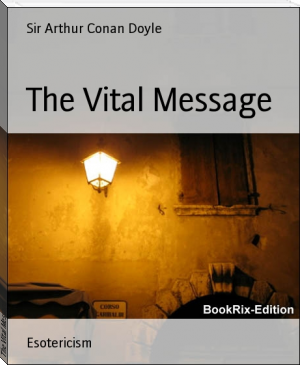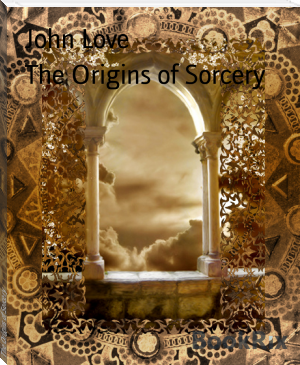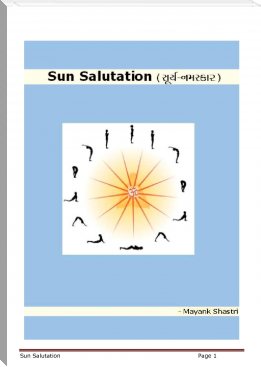The Vital Message by Sir Arthur Conan Doyle (ebook reader for manga .txt) 📕

Excerpt from the book:
Read free book «The Vital Message by Sir Arthur Conan Doyle (ebook reader for manga .txt) 📕» - read online or download for free at americanlibrarybooks.com
Download in Format:
- Author: Sir Arthur Conan Doyle
Read book online «The Vital Message by Sir Arthur Conan Doyle (ebook reader for manga .txt) 📕». Author - Sir Arthur Conan Doyle
rarely mentioned of old. So, too, Spirit-photography, where the camera records what the human eye cannot see, is necessarily a new testimony. Nothing is evidence to those who do not examine evidence, but I can attest most solemnly that I personally know of several cases where the image upon the plate after death has not only been unmistakable, but also has differed entirely from any pre-existing photograph.
As to the methods by which the early Christians communicated with the spirits, or with the "Saints" as they called their dead brethren, we have, so far as I know, no record, though the words of John: "Brothers, believe not every spirit, but try the spirits whether they are of God," show very clearly that spirit communion was a familiar idea, and also that they were plagued, as we are, by the intrusion of unwelcome spiritual elements in their intercourse. Some have conjectured that the "Angel of the Church," who is alluded to in terms which suggest that he was a human being, was really a medium sanctified to the use of that particular congregation. As we have early indications of bishops, deacons and other officials, it is difficult to say what else the "angel" could have been. This, however, must remain a pure speculation.
Another speculation which is, perhaps, rather more fruitful is upon what principle did Christ select his twelve chief followers. Out of all the multitudes he chose twelve men. Why these particular ones? It was not for their intelligence or learning, for Peter and John, who were among the most prominent, are expressly described as "unlearned and ignorant men." It was not for their virtue, for one of them proved to be a great villain, and all of them deserted their Master in His need. It was not for their belief, for there were great numbers of believers. And yet it is clear that they were chosen on some principle of selection since they were called in ones and in twos. In at least two cases they were pairs of brothers, as though some family gift or peculiarity, might underlie the choice.
Is it not at least possible that this gift was psychic power, and that Christ, as the greatest exponent who has ever appeared upon earth of that power, desired to surround Himself with others who possessed it to a lesser degree? This He would do for two reasons. The first is that a psychic circle is a great source of strength to one who is himself psychic, as is shown continually in our own experience, where, with a sympathetic and helpful surrounding, an atmosphere is created where all the powers are drawn out. How sensitive Christ was to such an atmosphere is shown by the remark of the Evangelist, that when He visited His own native town, where the townspeople could not take Him seriously, He was unable to do any wonders. The second reason may have been that He desired them to act as His deputies, either during his lifetime or after His death, and that for this reason some natural psychic powers were necessary.
The close connection which appears to exist between the Apostles and the miracles, has been worked out in an interesting fashion by Dr. Abraham Wallace, in his little pamphlet "Jesus of Nazareth."[6] Certainly, no miracle or wonder working, save that of exorcism, is recorded in any of the Evangelists until after the time when Christ began to assemble His circle. Of this circle the three who would appear to have been the most psychic were Peter and the two fellow-fishermen, sons of Zebedee, John and James. These were the three who were summoned when an ideal atmosphere was needed. It will be remembered that when the daughter of Jairus was raised from the dead it was in the presence, and possibly, with the co-operation, of these three assistants. Again, in the case of the Transfiguration, it is impossible to read the account of that wonderful manifestation without being reminded at every turn of one's own spiritual experiences. Here, again, the points are admirably made in "Jesus of Nazareth," and it would be well if that little book, with its scholarly tone, its breadth of treatment and its psychic knowledge, was in the hands of every Biblical student. Dr. Wallace points out that the place, the summit of a hill, was the ideal one for such a manifestation, in its pure air and freedom from interruption; that the drowsy state of the Apostles is paralleled by the members of any circle who are contributing psychic power; that the transfiguring of the face and the shining raiment are known phenomena; above all, that the erection of three altars is meaningless, but that the alternate reading, the erection of three booths or cabinets, one for the medium and one for each materialised form, would absolutely fulfil the most perfect conditions for getting results. This explanation of Wallace's is a remarkable example of a modern brain, with modern knowledge, throwing a clear searchlight across all the centuries and illuminating an incident which has always been obscure.
When we translate Bible language into the terms of modern psychic religion the correspondence becomes evident. It does not take much alteration. Thus for "Lo, a miracle!" we say "This is a manifestation." "The angel of the Lord" becomes "a high spirit." Where we talked of "a voice from heaven," we say "the direct voice." "His eyes were opened and he saw a vision" means "he became clairvoyant." It is only the occultist who can possibly understand the Scriptures as being a real exact record of events.
There are many other small points which seem to bring the story of Christ and of the Apostles into very close touch with modern psychic research, and greatly support the close accuracy of some of the New Testament narrative. One which appeals to me greatly is the action of Christ when He was asked a question which called for a sudden decision, namely the fate of the woman who had been taken in sin. What did He do? The very last thing that one would have expected or invented. He stooped down before answering and wrote with his finger in the sand. This he did a second time upon a second catch-question being addressed to Him. Can any theologian give a reason for such an action? I hazard the opinion that among the many forms of mediumship which were possessed in the highest form by Christ, was the power of automatic writing, by which He summoned those great forces which were under His control to supply Him with the answer. Granting, as I freely do, that Christ was preternatural, in the sense that He was above and beyond ordinary humanity in His attributes, one may still inquire how far these powers were contained always within His human body, or how far He referred back to spiritual reserves beyond it. When He spoke merely from His human body He was certainly open to error, like the rest of us, for it is recorded how He questioned the woman of Samaria about her husband, to which she replied that she had no husband. In the case of the woman taken in sin, one can only explain His action by the supposition that He opened a channel instantly for the knowledge and wisdom which was preter-human, and which at once gave a decision in favor of large-minded charity.
It is interesting to observe the effect which these phenomena, or the report of them, produced upon the orthodox Jews of those days. The greater part obviously discredited them, otherwise they could not have failed to become followers, or at the least to have regarded such a wonder-worker with respect and admiration. One can well imagine how they shook their bearded heads, declared that such occurrences were outside their own experience, and possibly pointed to the local conjuror who earned a few not over-clean denarii by imitating the phenomena. There were others, however, who could not possibly deny, because they either saw or met with witnesses who had seen. These declared roundly that the whole thing was of the devil, drawing from Christ one of those pithy, common-sense arguments in which He excelled. The same two classes of opponents, the scoffers and the diabolists, face us to-day. Verily the old world goes round and so do the events upon its surface.
There is one line of thought which may be indicated in the hope that it will find development from the minds and pens of those who have studied most deeply the possibilities of psychic power. It is at least possible, though I admit that under modern conditions it has not been clearly proved, that a medium of great power can charge another with his own force, just as a magnet when rubbed upon a piece of inert steel can turn it also into a magnet. One of the best attested powers of D. D. Home was that he could take burning coals from the fire with impunity and carry them in his hand. He could then--and this comes nearer to the point at issue--place them on the head of anyone who was fearless without their being burned. Spectators have described how the silver filigree of the hair of Mr. Carter Hall used to be gathered over the glowing ember, and Mrs. Hall has mentioned how she combed out the ashes afterwards. Now, in this case, Home was clearly, able to convey, a power to another person, just as Christ, when He was levitated over the lake, was able to convey the same power to Peter, so long as Peter's faith held firm. The question then arises if Home concentrated all his force upon transferring such a power how long would that power last? The experiment was never tried, but it would have borne very, directly upon this argument. For, granting that the power can be transferred, then it is very clear how the Christ circle was able to send forth seventy disciples who were endowed with miraculous functions. It is clear also why, new disciples had to return to Jerusalem to be "baptised of the spirit," to use their phrase, before setting forth upon their wanderings. And when in turn they, desired to send forth representatives would not they lay hands upon them, make passes over them and endeavour to magnetise them in the same way--if that word may express the process? Have we here the meaning of the laying on of hands by the bishop at ordination, a ceremony to which vast importance is still attached, but which may well be the survival of something really vital, the bestowal of the thaumaturgic power? When, at last, through lapse of time or neglect of fresh cultivation, the power ran out, the empty formula may have been carried on, without either the blesser or the blessed understanding what it was that the hands of the bishop, and the force which streamed from them, were meant to bestow. The very words "laying on of hands" would seem to suggest something different from a mere benediction.
Enough has been said, perhaps, to show the reader that it is possible to put forward a view of Christ's life which would be in strict accord with the most modern psychic knowledge, and which, far from supplanting Christianity, would show the surprising accuracy of some of the details handed down to us, and would support the novel conclusion that those very miracles, which have been the stumbling block to so many truthful, earnest minds, may finally offer some very cogent
As to the methods by which the early Christians communicated with the spirits, or with the "Saints" as they called their dead brethren, we have, so far as I know, no record, though the words of John: "Brothers, believe not every spirit, but try the spirits whether they are of God," show very clearly that spirit communion was a familiar idea, and also that they were plagued, as we are, by the intrusion of unwelcome spiritual elements in their intercourse. Some have conjectured that the "Angel of the Church," who is alluded to in terms which suggest that he was a human being, was really a medium sanctified to the use of that particular congregation. As we have early indications of bishops, deacons and other officials, it is difficult to say what else the "angel" could have been. This, however, must remain a pure speculation.
Another speculation which is, perhaps, rather more fruitful is upon what principle did Christ select his twelve chief followers. Out of all the multitudes he chose twelve men. Why these particular ones? It was not for their intelligence or learning, for Peter and John, who were among the most prominent, are expressly described as "unlearned and ignorant men." It was not for their virtue, for one of them proved to be a great villain, and all of them deserted their Master in His need. It was not for their belief, for there were great numbers of believers. And yet it is clear that they were chosen on some principle of selection since they were called in ones and in twos. In at least two cases they were pairs of brothers, as though some family gift or peculiarity, might underlie the choice.
Is it not at least possible that this gift was psychic power, and that Christ, as the greatest exponent who has ever appeared upon earth of that power, desired to surround Himself with others who possessed it to a lesser degree? This He would do for two reasons. The first is that a psychic circle is a great source of strength to one who is himself psychic, as is shown continually in our own experience, where, with a sympathetic and helpful surrounding, an atmosphere is created where all the powers are drawn out. How sensitive Christ was to such an atmosphere is shown by the remark of the Evangelist, that when He visited His own native town, where the townspeople could not take Him seriously, He was unable to do any wonders. The second reason may have been that He desired them to act as His deputies, either during his lifetime or after His death, and that for this reason some natural psychic powers were necessary.
The close connection which appears to exist between the Apostles and the miracles, has been worked out in an interesting fashion by Dr. Abraham Wallace, in his little pamphlet "Jesus of Nazareth."[6] Certainly, no miracle or wonder working, save that of exorcism, is recorded in any of the Evangelists until after the time when Christ began to assemble His circle. Of this circle the three who would appear to have been the most psychic were Peter and the two fellow-fishermen, sons of Zebedee, John and James. These were the three who were summoned when an ideal atmosphere was needed. It will be remembered that when the daughter of Jairus was raised from the dead it was in the presence, and possibly, with the co-operation, of these three assistants. Again, in the case of the Transfiguration, it is impossible to read the account of that wonderful manifestation without being reminded at every turn of one's own spiritual experiences. Here, again, the points are admirably made in "Jesus of Nazareth," and it would be well if that little book, with its scholarly tone, its breadth of treatment and its psychic knowledge, was in the hands of every Biblical student. Dr. Wallace points out that the place, the summit of a hill, was the ideal one for such a manifestation, in its pure air and freedom from interruption; that the drowsy state of the Apostles is paralleled by the members of any circle who are contributing psychic power; that the transfiguring of the face and the shining raiment are known phenomena; above all, that the erection of three altars is meaningless, but that the alternate reading, the erection of three booths or cabinets, one for the medium and one for each materialised form, would absolutely fulfil the most perfect conditions for getting results. This explanation of Wallace's is a remarkable example of a modern brain, with modern knowledge, throwing a clear searchlight across all the centuries and illuminating an incident which has always been obscure.
When we translate Bible language into the terms of modern psychic religion the correspondence becomes evident. It does not take much alteration. Thus for "Lo, a miracle!" we say "This is a manifestation." "The angel of the Lord" becomes "a high spirit." Where we talked of "a voice from heaven," we say "the direct voice." "His eyes were opened and he saw a vision" means "he became clairvoyant." It is only the occultist who can possibly understand the Scriptures as being a real exact record of events.
There are many other small points which seem to bring the story of Christ and of the Apostles into very close touch with modern psychic research, and greatly support the close accuracy of some of the New Testament narrative. One which appeals to me greatly is the action of Christ when He was asked a question which called for a sudden decision, namely the fate of the woman who had been taken in sin. What did He do? The very last thing that one would have expected or invented. He stooped down before answering and wrote with his finger in the sand. This he did a second time upon a second catch-question being addressed to Him. Can any theologian give a reason for such an action? I hazard the opinion that among the many forms of mediumship which were possessed in the highest form by Christ, was the power of automatic writing, by which He summoned those great forces which were under His control to supply Him with the answer. Granting, as I freely do, that Christ was preternatural, in the sense that He was above and beyond ordinary humanity in His attributes, one may still inquire how far these powers were contained always within His human body, or how far He referred back to spiritual reserves beyond it. When He spoke merely from His human body He was certainly open to error, like the rest of us, for it is recorded how He questioned the woman of Samaria about her husband, to which she replied that she had no husband. In the case of the woman taken in sin, one can only explain His action by the supposition that He opened a channel instantly for the knowledge and wisdom which was preter-human, and which at once gave a decision in favor of large-minded charity.
It is interesting to observe the effect which these phenomena, or the report of them, produced upon the orthodox Jews of those days. The greater part obviously discredited them, otherwise they could not have failed to become followers, or at the least to have regarded such a wonder-worker with respect and admiration. One can well imagine how they shook their bearded heads, declared that such occurrences were outside their own experience, and possibly pointed to the local conjuror who earned a few not over-clean denarii by imitating the phenomena. There were others, however, who could not possibly deny, because they either saw or met with witnesses who had seen. These declared roundly that the whole thing was of the devil, drawing from Christ one of those pithy, common-sense arguments in which He excelled. The same two classes of opponents, the scoffers and the diabolists, face us to-day. Verily the old world goes round and so do the events upon its surface.
There is one line of thought which may be indicated in the hope that it will find development from the minds and pens of those who have studied most deeply the possibilities of psychic power. It is at least possible, though I admit that under modern conditions it has not been clearly proved, that a medium of great power can charge another with his own force, just as a magnet when rubbed upon a piece of inert steel can turn it also into a magnet. One of the best attested powers of D. D. Home was that he could take burning coals from the fire with impunity and carry them in his hand. He could then--and this comes nearer to the point at issue--place them on the head of anyone who was fearless without their being burned. Spectators have described how the silver filigree of the hair of Mr. Carter Hall used to be gathered over the glowing ember, and Mrs. Hall has mentioned how she combed out the ashes afterwards. Now, in this case, Home was clearly, able to convey, a power to another person, just as Christ, when He was levitated over the lake, was able to convey the same power to Peter, so long as Peter's faith held firm. The question then arises if Home concentrated all his force upon transferring such a power how long would that power last? The experiment was never tried, but it would have borne very, directly upon this argument. For, granting that the power can be transferred, then it is very clear how the Christ circle was able to send forth seventy disciples who were endowed with miraculous functions. It is clear also why, new disciples had to return to Jerusalem to be "baptised of the spirit," to use their phrase, before setting forth upon their wanderings. And when in turn they, desired to send forth representatives would not they lay hands upon them, make passes over them and endeavour to magnetise them in the same way--if that word may express the process? Have we here the meaning of the laying on of hands by the bishop at ordination, a ceremony to which vast importance is still attached, but which may well be the survival of something really vital, the bestowal of the thaumaturgic power? When, at last, through lapse of time or neglect of fresh cultivation, the power ran out, the empty formula may have been carried on, without either the blesser or the blessed understanding what it was that the hands of the bishop, and the force which streamed from them, were meant to bestow. The very words "laying on of hands" would seem to suggest something different from a mere benediction.
Enough has been said, perhaps, to show the reader that it is possible to put forward a view of Christ's life which would be in strict accord with the most modern psychic knowledge, and which, far from supplanting Christianity, would show the surprising accuracy of some of the details handed down to us, and would support the novel conclusion that those very miracles, which have been the stumbling block to so many truthful, earnest minds, may finally offer some very cogent
Free e-book: «The Vital Message by Sir Arthur Conan Doyle (ebook reader for manga .txt) 📕» - read online now on website american library books (americanlibrarybooks.com)
Similar e-books:





Comments (0)